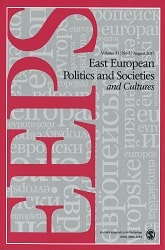Legitimacy and the Paradox of Technocratic Government in Newer European Democracies: The Fischer Administration in the Czech Republic Revisited
Legitimacy and the Paradox of Technocratic Government in Newer European Democracies: The Fischer Administration in the Czech Republic Revisited
Author(s): Seán HanleySubject(s): Civil Society, Governance, Government/Political systems, Politics and society, Sociology of Politics
Published by: SAGE Publications Ltd
Keywords: party government; technocracy; Czech Republic; legitimacy; representative claims;
Summary/Abstract: The creation of technocratic caretaker governments in several European countries in the wake of the Great Recession (2008–2009) and the Eurozone crisis led to renewed academic interest in such administrations. Although such governments are often assumed to be illegitimate and democratically dysfunctional, there has been little empirical consideration of if and how they legitimate themselves to mass publics. This question is particularly acute given that, empirically, caretaker technocrat-led administrations have been clustered in newer, more crisis-prone democracies in Southern and Eastern Europe where high levels of state exploitation by parties suggest a weak basis for any government claiming technocratic impartiality. This article uses Michael Saward’s “representative claims” framework to re-examine the case of one of Europe’s longer-lasting and most popular technocratic administrations, the 2009–2010 Fischer government in the Czech Republic. The article maps representative claims made for Fischer and his government, as well as counterclaims. Claims drew on the electoral mandate of sponsoring parties, the government’s claimed technocratic neutrality, and on Fischer’s “mirroring” of the values and lifestyle of ordinary Czechs (echoing some populist framings of politics). The article argues that the Fischer government benefited from multiple overlapping representative claims, but notes the need for robust methodology to assess the reception claims by their intended constituency. It concludes by considering the implications of actors’ ability to combine populist and technocratic claims, noting similarities in technocratic governments and some types of anti-establishment party.
Journal: East European Politics and Societies
- Issue Year: 32/2018
- Issue No: 01
- Page Range: 78-100
- Page Count: 23
- Language: English
- Content File-PDF

